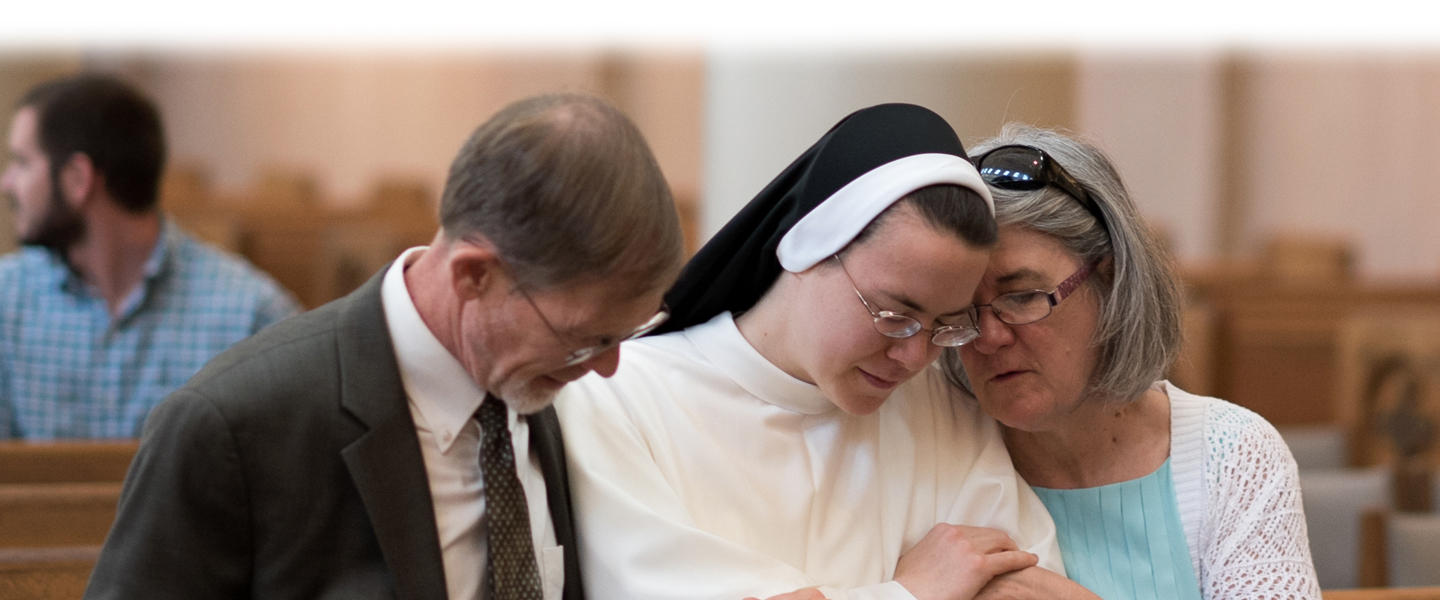
Behind and before every vocation to the priesthood or to the consecrated life there is always the strong and intense prayer of someone: a grandmother, a grandfather, a mother, a father, a community... This is why Jesus said: “Pray therefore the Lord of the harvest,” that is, God the Father, “to send out laborers into his harvest” (Mt 9:38). Vocations are born in prayer and from prayer; and only through prayer can they persevere and bear fruit. (Pope Francis)

Below is a list of common questions parents may ask as their daughter discerns a vocation to the religious life. We pray that our responses will be a source of reassurance and support for parents as they walk with their daughter on her path of discernment.
1. What is the best age for a woman to enter religious life?
The best answer to that question is “whenever she is ready.” One woman may be ready to begin the process at the age of 20, while another, at age 26, may not be. Self-knowledge and an understanding of the sacrifices and joys of the life are important. During the time of discernment, it is also important that she reflect on her motives, seek information on religious life and on the community to which she feels called, and determine her own fitness for the life. Although it is to be expected that a young woman desiring to begin the process of religious formation may have areas in which she needs to grow in personal maturity if she has an immature attitude about the reality of living religious life, she might be advised to wait before entering the community. Health complications and financial concerns can also delay entrance.
2. Will my daughter be happy and fulfilled in this way of life since she will give up marriage?
Every person is created to find happiness through a total gift of self (cf. Gaudium et Spes §24). Each vocational path offers/provides a different way of making that gift. For women called to the consecrated life, God has placed in their hearts a deep desire to give themselves totally through spousal union with Christ and a spiritual motherhood toward all souls entrusted to her care. Thus as consecrated women we will find our greatest fulfillment by loving in this way. And as we are drawn ever more deeply into this union with Christ, we will be able to love others, including our own families and those whom we serve in the apostolate, more and more with His heart, which is an infinite source of love.
3. Our daughter has a career she enjoys. Will she have to give this up for work she does not like?
“For I know well the plans I have in mind for you, says the Lord, plans for your welfare and not for woe, so as to give you a future of hope” (Jeremiah 29:11). In His plans for us, God always has our ultimate happiness in mind. His invitation to this greater happiness can involve the sacrifice of good, even very good, things such as a promising and enjoyable career. Since God knows our hearts even better than we know our own, his invitation is, at the heart, an invitation to trust Him, to trust that His plans can bring us a joy “beyond our wildest dreams”. Thus if the Lord is truly directing a young woman to a community with an apostolate different from the work she currently does or the work she has imagined for herself, she can be confident that the Lord will provide all that she needs to fulfill her mission and to find joy in doing so.
4. What if don’t think my daughter (sister, friend, relative) is ready to make such a life-long commitment?
All of us need a time of preparation if we are to make a commitment that is to be permanent. This is certainly true of a commitment to give oneself entirely to God through religious consecration. For this reason the Church required that religious vows be made for a specific period of time and then renewed prior to acceptance for final profession of vows. This enables the young woman to continue her formation while actually living the vows of poverty, chastity and obedience. She receives the grace of the vows as she is formed in living the vows. These are years in which she continues to prepare for perpetual profession.
The formation program in this community includes the following stages:
1. Year One: Postulancy
2. Year Two and Three: Novice Years (Canonical and Apostolic Novitiate). At the end of these years, First Vows are taken for a period of three years.
3. Year Four through Year Six: Continued formation while under vows. At the end of Year Six vows are renewed for a period of two years.
4. Year Seven and Year Eight: Continued formation while under vows. At the end of Year Eight Perpetual Vows are taken.
Readiness for commitment is the fruit of a young woman’s receptivity to God’s grace and openness to formation. It is rooted in the conviction that she is responding to God’s loving call to her personally. Her desire to give herself through religious profession is one of spousal love, a love of choice. She desires to give herself entirely to God, who gives Himself to her. In trusting God’s plan for her happiness, she finds the freedom to commit her entire life to Him.
5. What can we do to help our daughter discern her vocation?
Pray, pray, pray! It is important for parents to encourage their daughter to pray daily to know God’s will for her life. Family prayer that each member will be open to God’s call and have the courage to listen for His voice is a powerful help. Families may decide to pray together, perhaps a nightly rosary (or a decade of the Rosary), or a special prayer for vocations. As the opportunity presents itself, it is also helpful to introduce your daughter to religious women so that she has knowledge of this vocation. As the young woman matures, she may desire to attend a retreat hosted by a religious community. Devotion to the Blessed Mother and the saints is also an aide to vocation discernment. Additionally, it is important for parents to assist their daughter in deepening her relationship with the Lord and growing in selfless love, especially through the example of their own lives of faith. This formation will provide the greatest preparation for living out the vocation to which the Lord is calling her.
A Parent’s Prayer
Dear Lord, You love our daughter and you want her to be happy, fulfilled and at peace. Reveal your face to her. Guide her choices. May she grow to be a woman of wisdom, to know the vocation to which you are calling her; and a woman of courage, to answer that call. Help us to encourage our daughter to seek your face each so that her life can be spent in your service, bringing love, hope and peace to the world. Help us to trust you with her fulfillment and happiness. We ask this through Christ our Lord. Amen.
6. What happens if my daughter becomes ill? As the years go on and she grows older, who will take care of her?
When your daughter joins a community, she joins a family. There will be younger and older women in her community who truly become her sisters and they will love and care for her as she does for them. They will also love, care and pray for you as part of their family.
7. Will she be lonely?
Your daughter will be part of a spiritual family which will love and care for her for the rest of her life. Loneliness is part of human life and will be found in any vocation. While there may be times of loneliness, her deep relationship with Christ will be a source of great peace, joy, and fulfillment. Community is a vital part of religious life. Friendships formed in community are strengthened through mission experiences, celebrations, studies, formation opportunities, and in the joys and struggles of daily life.
8. Is it ok to feel somewhat sad to ‘lose’ my daughter? Won’t this separation result in strained relations, or cause our daughter to grow apart from her family?
It is perfectly natural to feel sad as your daughter takes this next step in her adult life. In making the sacrifice of allowing her to choose this way of life freely, however, you are giving her a wonderful gift. The love and support of her parents as she takes this step is real source of strength for her.
It has been our experience that young women who enter the community having been blessed with close family relationships find that these relationships grow stronger. In fact, God has used those very family relationships as a means of grace to prepare her to hear and respond to his call.


 Back
Back